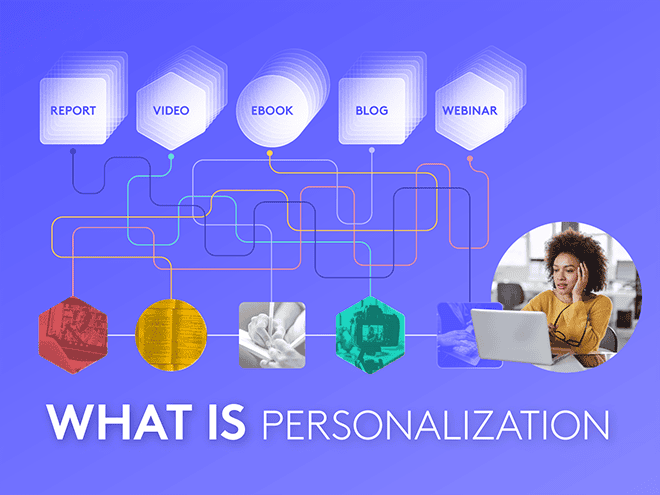
What is Personalization?
Mastering Personalization in B2B Marketing
For B2B marketers, personalization is essential, largely because buyers expect tailored experiences that meet their specific needs and preferences. How can you, a marketer, seamlessly integrate personalization into the B2B buyer journey? Let’s explore the power of personalized content in transforming your marketing strategy and building genuine connections.
What is Personalization?
Personalized content in B2B marketing is all about tailoring your messaging, offers, and experiences to cater to the unique needs and preferences of individual buyers or specific groups. It goes beyond the surface level of addressing someone by their name; it entails delivering content that is relevant, timely, and valuable based on factors such as industry, role, challenges, and stage in the buyer journey.
Key Elements of Personalized Content
Dynamic Content: This adjusts in real time based on user behavior and preferences.
Segmentation: Dividing your audience into distinct groups enables targeted messaging.
Behavioral Triggers: Utilizing actions the buyer takes to trigger specific content delivery.
Content Recommendations: Suggesting content tailored to the buyer’s interests and needs.
Why Personalization Matters in the B2B Buyer Journey
The B2B buying process can be complex, often involving multiple stakeholders. Personalization helps simplify things by making sure each person, from potential customers to sales reps, gets content that addresses their specific concerns and needs, speeding up the decision-making process.
Benefits of Personalization
Enhanced Engagement: Personalized content captures and retains the attention of your audience more effectively.
Improved Conversion Rates: Timely and relevant content increases the likelihood of conversions.
Shortened Sales Cycles: Addressing specific needs accelerates the decision-making process.
Stronger Relationships: Tailored interactions foster trust and strengthen relationships with prospects and customers.
How Personalized Content Moves Buyers Through the B2B Buyer Journey
At the top of the funnel, personalized content plays a pivotal role in capturing the attention of potential buyers. This stage focuses on raising awareness about your brand and solutions through targeted content such as personalized emails, social media posts, and blog articles that address specific pain points.
In the consideration stage, personalized content nurtures leads by providing detailed information that addresses their specific needs and challenges. This may include personalized webinars, whitepapers, and comparison guides tailored to help them evaluate your offerings.
At the bottom of the funnel, personalized content facilitates the decision-making process by providing detailed and customized information that reassures buyers they are making the right choice. This could involve personalized proposals and customer testimonials tailored to address the unique needs of each stakeholder.
Unlocking the Power of Personalized Content in Your B2B Strategy
So, you’re eager to elevate your B2B marketing game with personalized content? Fantastic! Here’s a comprehensive guide to get you started:
Step 1: Get the Scoop with Data
Dive into your data treasure trove to gain insights into your audience’s preferences, behaviors, and needs. Utilize CRM systems, analytics tools, and marketing automation platforms to gather valuable insights.
Step 2: Divide and Conquer with Segmentation
Segment your audience based on criteria such as industry, company size, roles, and engagement levels. This allows you to tailor your content to each group’s specific interests and needs.
Step 3: Craft Your Personalized Content
With your segments in mind, create content that speaks directly to their pain points and desires. Whether it’s blog posts, videos, or infographics, ensure that your content is relevant, timely, and valuable.
Strategies for Effective Personalization
To effectively implement personalization in your B2B marketing strategy, consider these strategies:
Account-Based Marketing (ABM): Focus on high-value accounts and create highly personalized campaigns tailored to the specific needs of each account.
Lead Nurturing: Develop personalized email workflows based on user behavior, such as website visits, downloads, and interactions with previous emails.
Custom Landing Pages: Create landing pages tailored to different segments or even individual accounts to enhance relevance and engagement.
AI and Machine Learning: Use AI-powered tools to analyze data and predict user behavior, allowing for more accurate personalization.
Overcoming Challenges in Personalization
While personalization offers numerous benefits, it also comes with challenges that need to be addressed:
Data Privacy: Ensure compliance with data protection regulations such as GDPR and CCPA. Be transparent about data usage and obtain the necessary consent.
Data Integration: Integrate data from various sources to create a unified view of each customer. This requires robust data management and analytics capabilities.
Scalability: As your business grows, maintaining the same level of personalization can be challenging. Use automation tools to scale personalized experiences.
Content Creation: Producing personalized content for different segments can be resource-intensive. Develop a content strategy that prioritizes high-impact segments.
Practical Examples of Personalized Content in B2B Marketing
Case Studies and Testimonials: Showcase case studies and testimonials from companies similar to your target accounts to demonstrate relevant success stories.
Interactive Content: Use interactive tools such as quizzes, assessments, and calculators that provide personalized recommendations based on user input.
Personalized Web Experiences: Customize website content based on visitor data, such as industry, company size, and previous interactions.
Tailored Sales Outreach: Equip your sales team with personalized sales materials and insights to make their outreach more relevant and effective.
Conclusion
Personalization in B2B marketing is no longer optional—it’s essential. By leveraging personalized content, you can create more meaningful and relevant experiences for your audience, driving engagement, conversions, and long-term relationships. Start by understanding your audience, segmenting effectively, and crafting content that resonates on a personal level. As you integrate these strategies into your marketing efforts, you’ll find that personalized content not only enhances your marketing performance but also sets you apart in the competitive B2B landscape.
